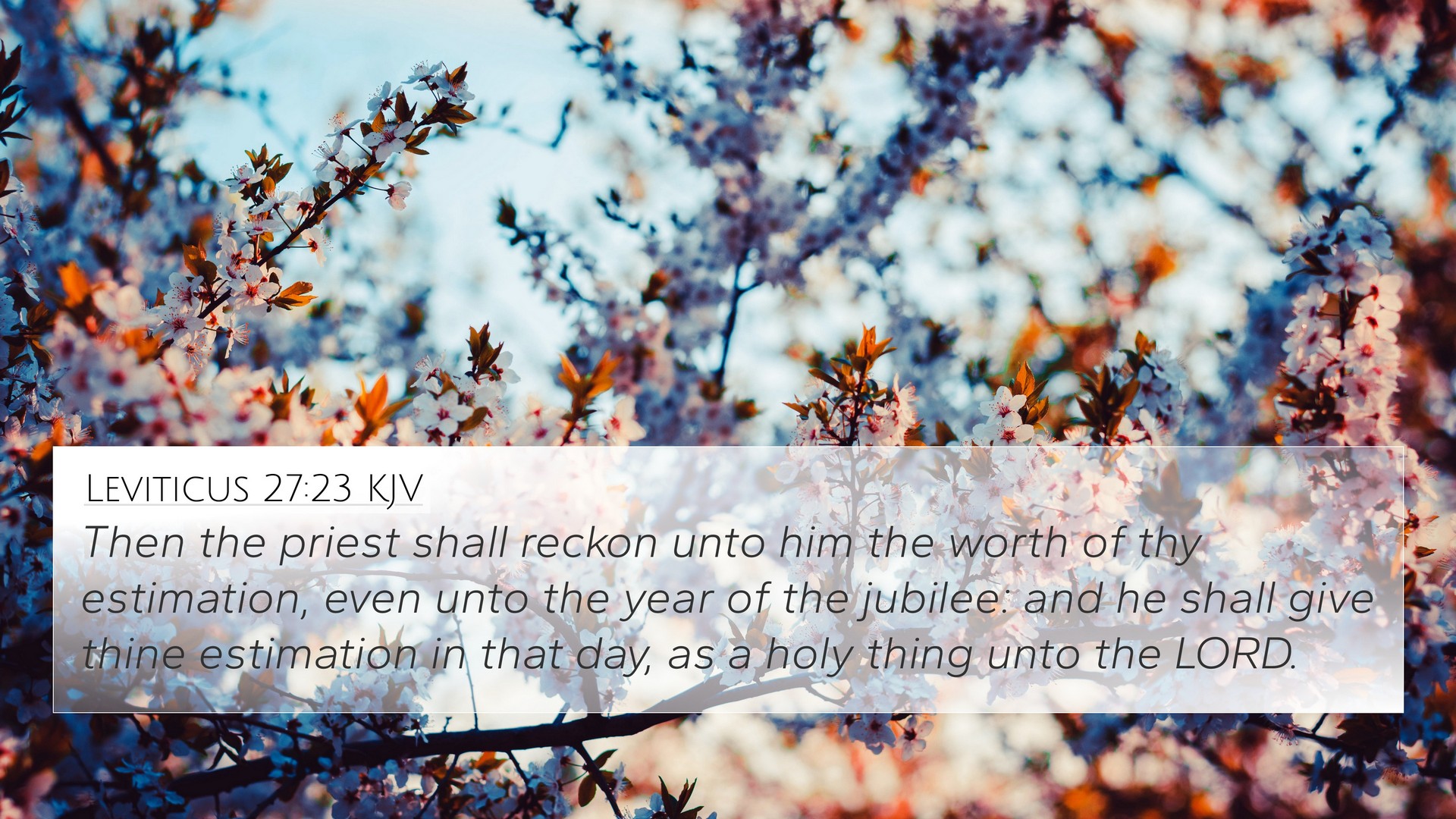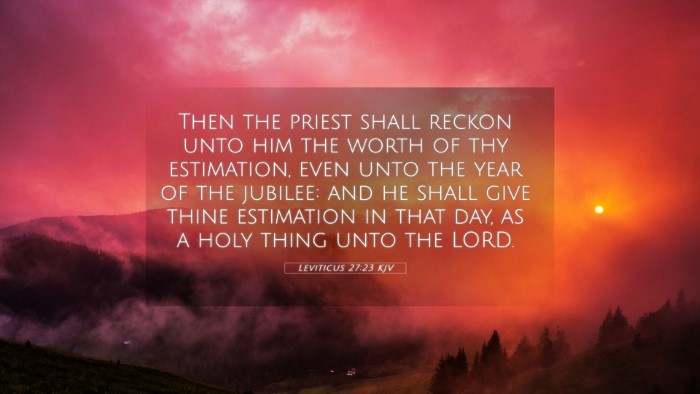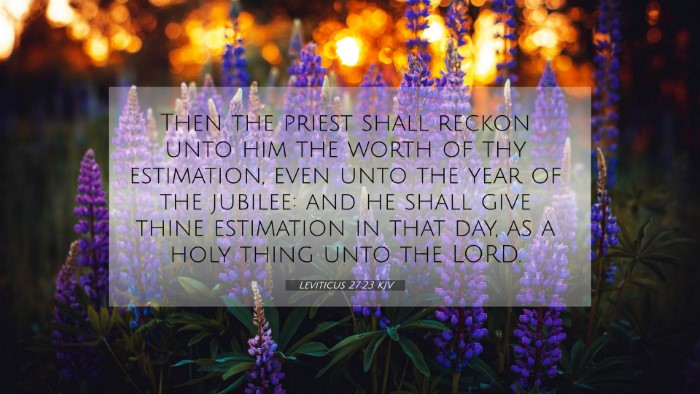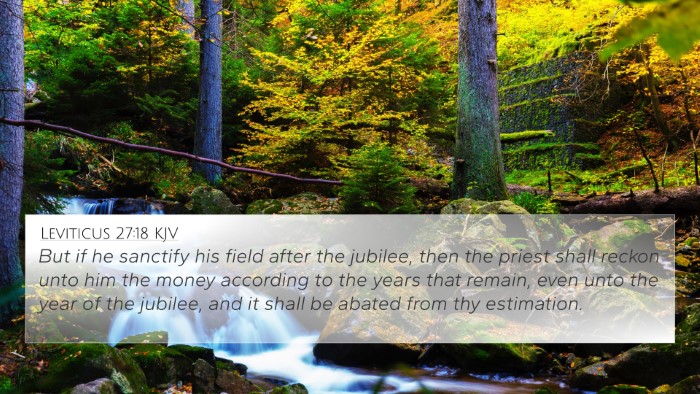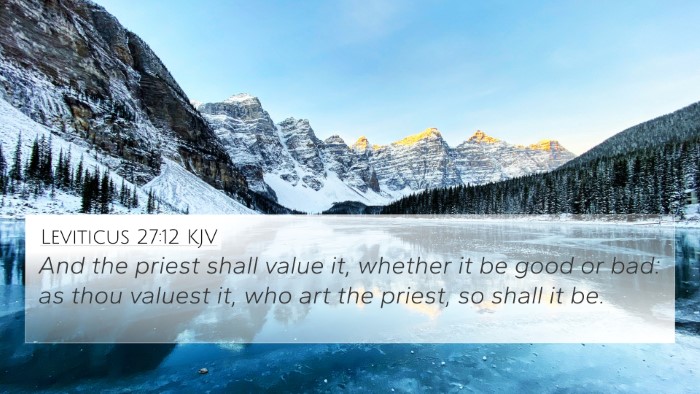Understanding Leviticus 27:23
Verse Text: "But the firstling of the animals, which should be the Lord's firstling, no man shall sanctify it; whether it be ox, or sheep: it is the Lord's."
Summary of Insights
Leviticus 27:23 deals with the offerings and dedicating of animals to the Lord as part of Mosaic Law. The verse highlights God's ownership over the firstborn of animals, emphasizing that they are to be set apart as holy. Below is a detailed examination of the verse’s meanings and implications drawn from various public domain commentaries.
Commentary Insights
-
Matthew Henry:
Henry notes that this verse stresses the divine right of God to the firstfruits of all that He provides. It reflects both the acknowledgment of God in one’s possession and the call for holiness in offerings. He underscores that the law established here reinforces the importance of prioritizing what belongs to God.
-
Albert Barnes:
Barnes interprets this verse in the context of redemption and sacrifice, observing that the firstborn animals symbolize the best offerings to God. Each offering serves as an acknowledgment of God’s sovereignty and an act of worship. Barnes emphasizes that even the best of one's possessions—the firstborn—is to be recognized and given to God.
-
Adam Clarke:
Clarke highlights the significance of the firstborn in biblical tradition, pointing out its representation of strength and productivity. He reflects on how dedicating the firstborn recognizes its divine origin and purpose. This act not only honors God but also fosters a habit of dedicating the best to Him, promoting spiritual discipline among the Israelites.
Thematic Connections
The concept of offering the firstborn to God is a recurrent theme throughout the Scriptures. Below are some vital Bible verse cross-references that illustrate the inter-Biblical dialogue concerning this theme:
- Exodus 13:12-15: Addresses the consecration of all firstborn males in Israel.
- Numbers 18:15-16: Discusses the redemption of the firstborn of both man and animal.
- Deuteronomy 15:19-23: Elaborates on the sanctity of the firstborn and how it should be treated.
- Romans 11:16: Uses the principle of the firstborn to draw parallels in Christian thought regarding the sanctification of believers.
- Hebrews 12:23: Refers to the church of the firstborn enrolled in heaven, creating a link between OT practices and NT theology.
- Colossians 1:15-18: Presents Christ as the firstborn over all creation, integrating Messianic implications.
- 1 Peter 1:18-19: Highlights the significance of Christ's sacrifice and the eternal redemptive theme in relation to offerings.
Cross-Referencing Commentary
Understanding the connections between Bible verses enriches one's study of scripture. By employing tools for Bible cross-referencing, followers can uncover deeper insights and thematic elements:
- Bible Concordance: A valuable tool for finding specific words and their occurrences across the text.
- Bible Cross-Reference Guide: Helps locate verses that relate to a particular scripture.
- Cross-Reference Bible Study: Encourages deeper insights by examining interrelated scriptures.
- Bible Chain References: Provides links between verses to create thematic studies.
- Comprehensive Bible Cross-Reference Materials: Essential for thorough exploration of Biblical themes and concepts.
The act of cross-referencing not only aids individual understanding but also fosters enriched discussions during group studies and sermons. Knowing how to find cross-references in the Bible can bridges gaps and enhance comprehension across the Old and New Testament, making one's biblical study more fruitful.
Conclusion
Leviticus 27:23 serves as a reminder of the importance of dedicating the first and best to God, which resonates throughout the entirety of scripture. Through exploring its meanings and thematic connections, one can appreciate the richness of Biblical teachings and their interrelations. This verse is a call to honor God in all aspects of life, reflecting on what it means to live within His ordinances while fostering a rich dialogue between the scriptures.
